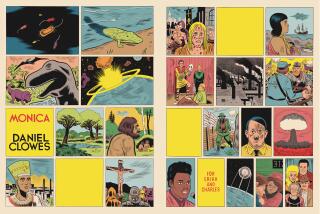He’s Behind ‘Eightball’
- Share via
Daniel Clowes, creator of the cult hit comic “Eightball,” waits until nightfall before pulling out his rapidograph and untwisting the cap of his imagination. It’s no surprise. Even when his characters are acting out their surreal suburban dramas in broad daylight, a sense of midnight pervades.
These are not comics of the superhero variety. The evil that lurks in “Eightball” is in the form of sloth, paranoia, consumerism, dysfunction and perversion.
“Eightball” No. 19 is the most recent installment of this twice-yearly comic and the first to contain a single story line, this one featuring David Boring. Boring looks a bit like actor Ed Norton, has the drive of a Yugo and works as a security guard. “He’s not supposed to be a geek. He’s charming,” says Clowes. “He is a type I have always been intrigued by--you can’t figure out what [his] appeal is, but [he has] no trouble getting beautiful women.” Boring and his love interest, Wanda, grace the cover, casually embracing as lightning and a tornado split the olive-green sky in the background. “It’s a story that could never be made into a movie.”
Clowes says this even as preparations are being made to commit his “Ghost World” to celluloid. The story was first published as a series in “Eightball” and later compiled in book form. Now the script is written, “complex deals” are in negotiation and director Terry Zwigoff (“Crumb”) is on board, as is Christina Ricci. Some fans are nervous about this move. The story is rich, if mordant, and while the series is cinematic on paper, will it be as engrossing on film? Movie screens can’t be combed over for hidden messages and clues the way a well-worn comic can.
Zwigoff is not the only one in Hollywood who sees film potential in Clowes’ work. Seeing parallels in their artistic visions, when director Todd Solondz was wrapping up his latest film, “Happiness,” he called Clowes with a brainstorm. “He said, ‘You have to get involved--maybe you can do a comic book of the movie,’ ” Clowes says. Clowes was intrigued; he loved the movie, “but I told him [the comic book] wouldn’t be ready for about five years.”
Several months later, the ad agency for the film called Clowes to commission the movie poster. Clowes presumed it was on Solondz’s recommendation, but it turned out that the agency had acted independently. “Somehow I was coming to mind [with] people when they saw this movie.”
More to Read
Only good movies
Get the Indie Focus newsletter, Mark Olsen's weekly guide to the world of cinema.
You may occasionally receive promotional content from the Los Angeles Times.








